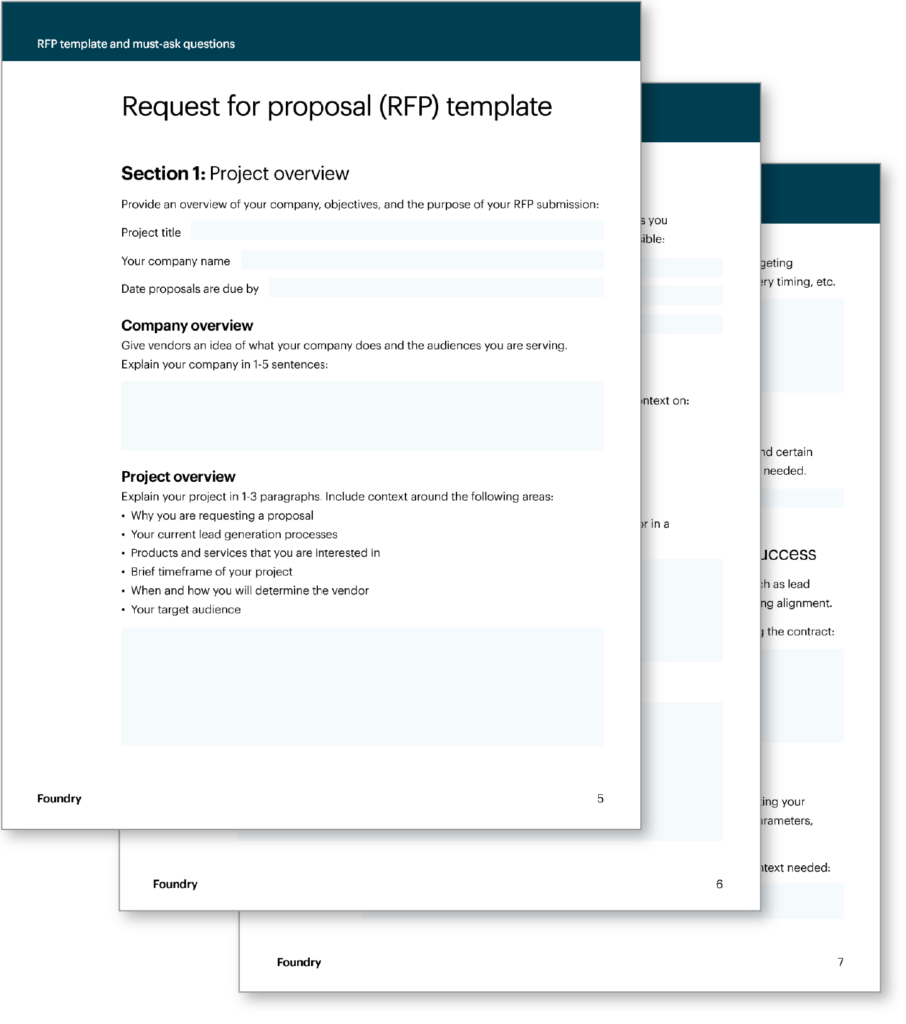One award, multiple contenders. How do you choose the right vendor when evaluating a marketing RFP?
The best relationships are formed with evaluation in both directions. You need to be able to trust your chosen vendor to deliver authentic, qualified leads that match your target audience. Using an RFP tips the scales in your favor—giving you power to make the best and most informed decision. Here are the questions you should consider and what to look for in your marketing RFPs.
1. What is the size of your database that fits our ICP?
Database size is inconsequential unless it aligns with your ICP. That’s why it’s extremely important to partner with a vendor who has quality data and can generate leads that align with your ICP. Vendors should provide a clear and specific response regarding the size, segmentation and relevance of their database, and how it aligns with your target audience’s needs and preferences. If a vendor is vague about database specifics, they may likely not be tailored toward your audience, or have outdated and incomplete data.
2. How is contact information sourced and validated, and what’s included with each lead?
As a marketer, you have a right to know where your provider’s data is coming from and how it’s maintained. If your provider struggles to answer this question, they’re likely relying on third-party vendors to guarantee volume. Instead, vendors should provide a detailed explanation of their contact sourcing methods, including whether they use third-party providers, or other channels.
You’ll also want to confirm which fields they provide with each lead. It’s important that your vendor is able to provide all the properties you need to qualify, route, and nurture leads. This can include first and last name, business email, job title, company, location, what action they took, and more.
3. How do you generate and qualify leads?
Understanding exactly how leads are generated and qualified is important to how they’ll perform.
Whether it’s BDRs, advertising, email, or something else, a good vendor will provide a detailed explanation of their lead generation methods. Leads are typically categorized based on their level of qualification. Examples include Marketing Qualified Leads (MQL) which have typically engaged with content, Sales Qualified Leads (SQL) which have often shown interest in a call, and BANT qualified leads which have answered questions about budget, authority, need, and timing.
Vendors should give insight into whether their leads are digital, human-verified, or not verified at all, as well as in-depth explanations of how their leads are qualified and segmented into lead tiers (MQL, BANT, etc.).
When it comes to how leads are qualified, dig deeper than just the channel being used. For example, if they say email marketing, make sure to ask what a person needs to do to be considered a lead from that email. Do they need to click the link and download the content, or is an open enough for the vendor to consider them a lead? When generating and qualifying leads, vendors should take your ICP into consideration, identifying the highest converting channels, as well as what actions truly signify an interest in your offering.

4. Will you commit to an even lead delivery pace?
The answer here has to be yes. Major delays, poor quality leads, or waiting until the campaign is complete to receive your leads, might mean you’re getting an aggregated list based on your audience, rather than their interest in your content.
You should expect your vendor to provide a clear view of their lead generation and distribution processes, to ensure a steady flow of leads throughout the campaign duration. This should include how often leads are delivered, where they go, and what fields are included. Regular lead deliveries give you the chance to follow up and convert these leads while you’re still top of mind.
5. What measures do you take to ensure compliance?
Non-compliant data can lead to major legal implications for your team. Given the risk, it’s crucial to ensure compliance with all relevant bodies before you sign a contract. This includes how regularly they audit their data, how often teams are trained in compliance measures, and ensuring this applies not just within the US, but to any international audiences as well.
Vendors should provide a list of compliance certifications, data protection and privacy laws, and marketing regulations they comply with, as well as exactly how they maintain compliance throughout their processes. This includes ensuring compliance from any third-party vendors they use.
6. What are your lead types and associated Cost per Lead (CPL)?
Not all leads are created equal, and you don’t need them to be. But you need to know the qualifiers between them and ensure the costs match. Vendors often price leads based on tier (MQL, SQL, BANT, etc.) and should provide a clear breakdown of the CPL for each lead tier, specifying costs associated with generating leads in different segments. They should explain how they determine lead tiers whether it’s based on lead quality, lead source, or other relevant factors.
7. What do you recommend customers do with the leads, and how will you deliver them?
Many vendors will simply hand over leads and consider their job done. While it’s true that they delivered on their end of the deal, these leads are ineffective unless acted upon. Vendors should recommend how to best follow up with leads they deliver, taking into account how the leads were generated and qualified. This may include lead nurturing tactics, targeted content, or other methods to further map the buyer’s journey.
In preparing to follow up with the leads you’re provided, you’ll need to understand how they’re getting passed back to you. Vendors deliver in various ways, including via CSV, their own platform, and direct CRM or marketing automation integrations. From there, you know whether you can set up automation for routing and activation, or if you need an import process before you use the leads.
8. Where is your lead generation team based?
Why should the geographical location of your lead generation team be an important factor in your decision? Data compliance laws vary globally. If your vendor operates in a region with strict data compliance laws, this may raise concerns when handling data and users’ privacy. To ensure vendors thoroughly understand and adhere
to relevant data regulations, it’s crucial to understand where they operate.
9. What type of leads, audiences, or industries do you specialize in?
When it comes to selecting the perfect fit for a partnership, specialization is key. Have they worked with companies in your industry before? What was the feedback? Results speak for themselves.
Require vendors to provide case studies and/or references from your space. A good vendor will be able to provide documentation that they have a deep understanding of your specific markets, and a track record of generating leads that align with your needs.
10. What information is included in campaign reporting?
One of the most important things a vendor can provide is the results driven by their work. Vendors should provide specific key metrics and KPIs in their campaign reports, and how frequently they will update you on campaign progress.
With regular reporting, you have a better chance of optimizing the campaign and catching any issues before it’s complete. Some metrics to look for in your lead generation report are most engaged personas, which assets they’re engaging with, and progress to goal.






